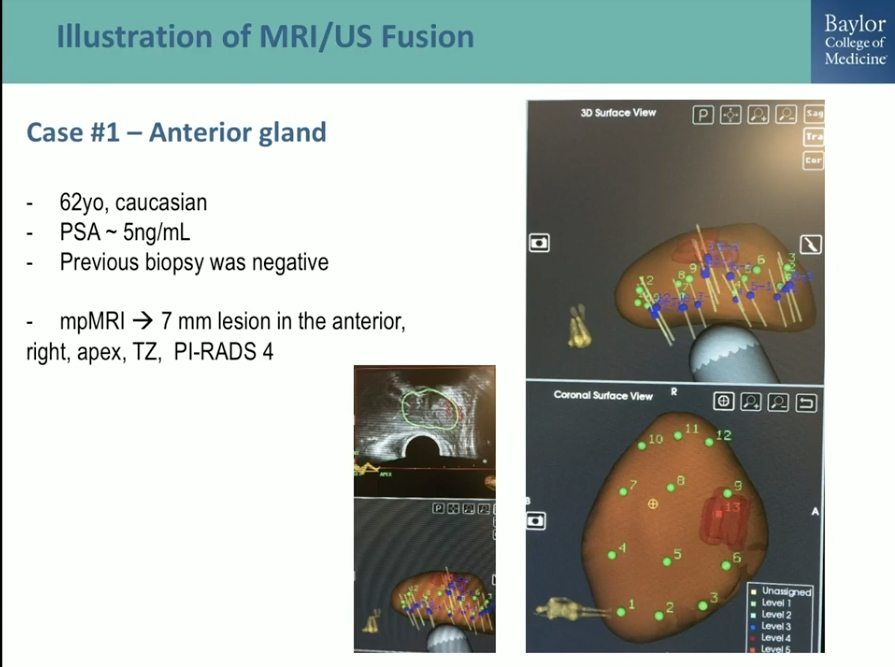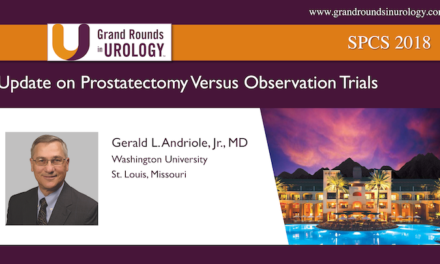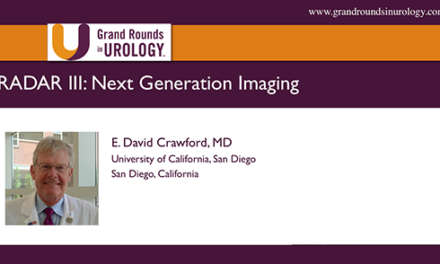Guilherme Godoy, MD, MPH, presented “The Pros and Cons of Imaging for Biopsy Guidance” during the 23rd Annual Innovations in Urologic Practice on September 14, 2018 in Santa Fe, New Mexico.
How to cite: Godoy, Guilherme. “The Pros and Cons of Imaging for Biopsy Guidance” September 14, 2018. Accessed Jun 2025. https://grandroundsinurology.com/the-pros-and-cons-of-imaging-for-biopsy-guidance/
The Pros and Cons of Imaging for Biopsy Guidance – Summary:
Guilherme Godoy, MD, MPH, provides an overview of the evolution of prostate cancer imaging technologies. He then discusses mpMRI targeted biopsy and the ability of this approach to detect significant prostate cancer and mitigate insignificant tumor detection.
Abstract:
This is a partner presentation coupled with John W. Davis’s “The Pros and Cons of Genomic Markers for Biopsy Guidance.” Although there can be a debate constructed between MRI and genomic biomarkers to guide prostate biopsy, clinicians generally integrate these technologies instead of using one over the over. This presentation focuses on the role of MRI in the evolution of prostate biopsy guiding methods.
In the past, crude parameters such as PSA, digital rectal exam (DRE), and sampling biopsy information guided clinical decisions. Sampling biopsies, in particular, have fundamental limitations that often lead to repeat biopsies, increasing cost to the patient and risk of complications and detection of indolent cancers. Improved transrectal ultrasound (TRUS) techniques emerged for the purpose of mitigating these risks. However, these techniques had limitations, and ultimately did not significantly improve accuracy in biopsy guidance.
The advent of multiparametric MRI (mpMRI) brought about the ability to localize, measure, follow, grade, and target lesions. MRI/ultrasound fusion not only allows for diagnostic utility in targeted biopsy, but also focal therapy strategies. When combined with MRI techniques, new genomic markers that integrate blood, urine, and tissue have a role in individualizing prostate cancer risk assessment. Updates and improvements in the Prostate Imaging Reporting and Data System (PI-RADS) also help to standardize the interpretation of MRI.
This discussion covers various MRI magnets and coils, as well as TW2 fast spin echo, diffusion-weighted imaging, apparent diffusion coefficients, dynamic contrast-enhancing, and MR spectroscopy imaging sequences. Additionally, this presentation reviews MRI’s accuracy in guiding prostate biopsy as demonstrated in the PROFUS, PROMIS, and PRECISION trials.
About Innovations in Urologic Practice
Innovations in Urologic Practice (IUP) is an annual CME-accredited conference devoted to updating urologists on the rapidly changing healthcare environment. Topics focus on innovative diagnostic and treatment strategies, controversies, new and currently developing technologies, and challenges in today’s urologic practice. Dr. Godoy presented this lecture during the 23rd IUP in 2018. Please visit this page in order to learn more about future IUP meetings.
ABOUT THE AUTHOR
Guilherme Godoy, MD, MS, serves as assistant professor of urology at the Baylor College of Medicine (BCM) in Houston, Texas. He joined the faculty of the Scott Department of Urology at BCM in 2012 and has been the chief of the urology service at Ben Taub General Hospital (Harris Health System), since 2017.
Dr. Godoy earned his medical degree from Fundacao Universitaria do ABC in Sao Paulo, Brazil. His training includes an internship and residency in urology at Santa Casa De Sao Paulo in Vila Buarque, Brazil, and a fellowship in urologic oncology at BCM. Dr. Godoy has also completed urologic oncology fellowship training at Vancouver General Hospital, New York University, and Memorial Sloan-Kettering Cancer Center. He earned his MS in clinical investigations at BCM and has remained active in clinical research, translational studies, and clinical trials, mostly focused on prostate, urothelial (upper and lower urinary tract), and testicular cancers.
Dr. Godoy’s expertise includes early diagnosis, minimally invasive approaches (endoscopic and robotic), utilization of molecular and genetic tools for personalized decision-making, management of hereditary cancers, and surgical management of complex/large genitourinary (GU) tumors. His clinical areas of interest include adrenal and kidney tumors, urothelial cancers (upper and lower urinary tract including ureter, renal pelvis, bladder, and urethra), prostate cancer, penile cancer, and testicular and paratesticular cancers. Dr. Godoy also specializes in the utilization of intestinal segments for urinary tract reconstructions, and coordination of multidisciplinary approaches to manage complex intra-abdominal, retroperitoneal, and pelvic tumors. Dr. Godoy is responsible for and moderates the GU Tumor Board Meetings at Baylor St. Luke’s Medical Center as well as the St. Luke’s International GU Tumor Board Meetings.





